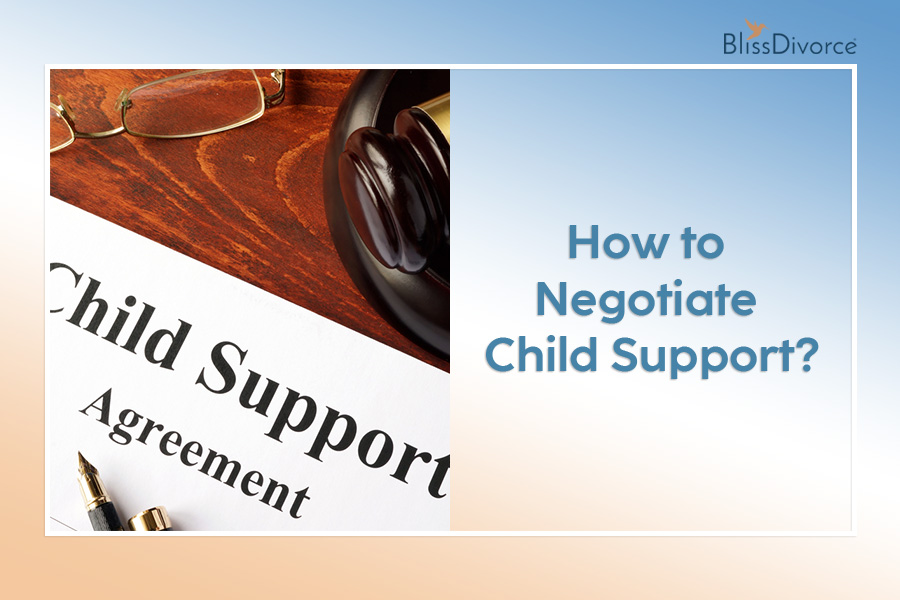Divorces are turbulent enough periods for spouses without children. But, the process becomes even more complicated when the spouses share children together. The well-being of the children is the most important thing, which is why you should know how to negotiate child support.
Child support ensures the children’s way of life remains as unchanged as possible. Its purpose is to ensure the children have the basic necessities and anything else they may need.
As the separation of their parents is an already emotionally troubling period, the parents must work together to ensure the children are well taken care of. So, let’s see some common strategies for negotiating child support payments.

Source: Shutterstock.com / Photo Contributor: Burdun Iliya
How to Negotiate Child Support Payments with Your Ex-Partner
Strategies for initiating the conversation
Protecting their child’s best interests is the most important thing for both parents. As such, they must work together to reach a child support agreement.
The best way to avoid additional issues and not risk ending in a court battle is without hiring a divorce attorney. Instead, choose to meet together and have an honest and open discussion regarding your child’s future and how the child support will look.
You can either meet in person or communicate through an online divorce platform. Make sure to choose an appropriate time and place before starting a negotiation.
It is crucial that both parents remain levelheaded and focused on the child’s needs throughout the negotiations. Remember, whatever resentment there may be between you and your ex-partner, you must set it aside for the welfare of your child/children.
Tips for discussing financial information and ensuring transparency
To ensure a successful child support adjustment negotiation or litigation, you must ensure that all of your financial documentation is in order. Generally, the court will want:
- copies of your work stubs
- bank statements for the few months before your request
- your last two years’ tax returns if you ask them to modify the child support amount
Discuss the child support amount and frequency of payments
In order to figure out the right amount of child support, both parents should make a monthly budget in which they outline the expenses of each child. If you and your ex-partner are making a budget for your child, you should include in it the following:
- Rent/mortgage
- Utilities, and food
- Clothing expenses,
- Extracurricular activities
You may also use the official California Guideline Child Support Calculator to estimate the amount that the court may order.
You can agree on a payment frequency that works best for both of you. Generally, the payment frequency is determined by the employment pay period of the obligated parent.
Child Welfare: Factors Considered When Determining Child Support
During child custody disputes and determining child support, the court takes into consideration, first and foremost, the child/children’s wellbeing. The best way to reach a fair agreement for the benefit of the children is to negotiate without attorneys.
Every state has its own laws regarding divorce and child support. In California, parents can come up with a parenting plan. Both parents must agree on every point entered in the agreement.
After the agreement is written, you should submit it to the court so the judge can enter it into your custody agreement. Who pays child support and how much depends on several factors, such as the following:
- Income of both parents
- Custody arrangements
- Health insurance and childcare costs
- Special needs of the child
- Standard of living before the separation
Income of both parents
The first factor in determining child support is estimating each parent’s income. Both parents must complete an Income and Expense Declaration (FL-150). The higher the income disparity, the higher the child support order will be.
But, if both parents earn relatively equal income, the child support order is going to be lower.
The court generally calculates the monthly income of each parent from pay stubs or W-2 returns of tax forms. The parent who pays for child support is obligated to do so until the child/children are 18 years old. 
Source: Shutterstock.com / Photo Contributor: Africa Studio
Custody arrangements
The custody arrangements are among the biggest factors in determining who pays child support to whom. For example, if the child spends significantly more time with one parent or only one parent has physical custody, then the other parent will pay support.
Child support ensures the children’s standard of life remains unchanged despite the other parent’s absence. Same as with income, the more time one parent spends with the child, the more child support the other will have to pay.
This is because the parent spending more time with the child incurs more in housing, clothing, feeding, and supporting the child than the other parent. With child support, this burden is supposed to be lessened.
Health insurance and health costs
In California, the court orders the cost of health insurance in addition to the child support. Health insurance and health costs per California family law are factored into every child support order.
As long as the parents have health insurance coverage, they are legally required to ensure the child is under the same coverage. The coverage must last until the child/children are no longer eligible for health insurance protection.
The parent may only stop coverage if the plan and premiums become cost-prohibitive. Under California law, a health insurance plan is cost-prohibitive when it exceeds 5% of a parent’s income.
For parents paying out of pocket for health insurance, the cost determines the final child support amounts. This means the final amount may be reduced.
Special needs of the child
While under California law, child support ends once the child turns 18 years old, there is an exception for children with disabilities. For parents with a child with qualifying disabilities, California law can require parents to provide financial support indefinitely.
Standard of living before the separation
Child support serves to minimize the disparity in the standard of living for the child after the separation of the parents. The court will order a child support amount that ensures the child’s needs are met, and there are no large discrepancies in their life post-divorce.
Can Child Support Agreements Be Modified Over Time?
Circumstances under which modifications are possible
If there are any significant changes in the obligated parent’s life, they may be able to ask for a modification to the child support agreement. The circumstances under which you may ask for a change are the following:
- Making significantly less money
- Ex-partner is making more money now
- You are spending more time with your children
- Laid off or fired from your job.
- You become physically incapable of caring for the child
- You got to jail
- You are deployed to active military service
The legal process for modifying child support agreements in California
If you and the other parent agree about the modifications, you may submit a written agreement to the court. But if you disagree with the changes, you may file a Request for Order (FL-300).
You may use the Request for Order to tell the court
- What do you want the court to order
- The reasons why the court should order what you are asking
Depending on the reasons you provide for changes to your child support, you must provide proof of the following:
- Current income and expense
- Medical insurance
- Any childcare expenses
- Disability status
- Jail or prison status
- Retirement income
- Unemployment benefits
- Current custody and visitation arrangements
After you submit the forms to your local county court, the judge will review them. If the judge deems your reasons reasonable, they will order the modifications to your child support agreement.
Common Strategies for Negotiating Child Support Payments
Emphasizing the child’s best interests
Often, child support disputes may turn ugly fast, so negotiations must remain civil. You mustn’t involve your child in any of the child support discussions you and your ex-partner have.
Not only is this unhealthy for the children, but the court also frowns upon this. The court looks out for the child’s best interests, which you should both do. You should ensure your child sees you acting civil and friendly towards each other.
Demonstrating a willingness to compromise
Remember that child support is there for your children and not your ex-partner. You both must be willing to compromise for the child’s best interests. If you are the parent obligated to pay child support remember that the money is to ensure your child has everything they need.
Utilizing mediation services
If you cannot reach an agreement, it is advisable to try mediation before getting involved. Mediation services are excellent for ex-partners learning to co-parent after a divorce.
There are many advantages to mediation. For child support negotiations, mediation offers an impartial third party that provides support for both sides so they reach the best agreement for their child’s interests.
Mediation may take place through in-person or online sessions. If both parents manage to work out their issues through mediation, all that is left to do is draw up the agreement and file it with the court.
Seeking legal advice if negotiations become challenging
Legal help should be the last option for child support negotiations. But sometimes tensions rise, and there is a possibility that a compromise is unreachable. In this instance, there is no other choice but to involve lawyers in the legal process. Lawyers are able to navigate challenging negotiations.
Key Steps Involved in Negotiating Child Support
Initial research on California Child Support Laws
Before you begin the child support negotiation process, you must conduct initial research into California laws regarding child support. Thorough research helps you understand the laws and your legal responsibilities post-divorce.
It is important to note that California law puts the interests of the children first. You and your ex-partner should reach an agreement without involving lawyers. They will undoubtedly complicate the process, not to mention the exorbitant fees you will have to pay.
To get ready to negotiate a child support modification, you will need the other parent’s financial details in addition to your own.
Gathering relevant financial information
To get ready to negotiate a child support modification, you will need the other parent’s financial details in addition to your own.
You should make plans to exchange information with the other parent when you have collected your documents and information. Having all the paperwork and data needed to prepare for your discussions will help you and the other parent.
You should make plans to exchange information with the other parent when you have collected your documents and information.
Initiating a respectful and open conversation with the ex-partner
After you conduct your research and gather all the relevant information, you and your ex-partner must have a conversation regarding child support.
The conversation should be respectful and open about the needs of the child/children. Keep the focus on the interest of your child/children and avoid the issues that lead to your separation.
Drafting a formal child support agreement and filing with the court
Before presenting your plan to the other parent, you will be able to see exactly how it will impact the amount of child support and decide if you would like to make any further modifications.
When preparing your child support documentation for the court, your state might have forms available for you to use. You may find all the forms needed for child support in California here. Once you draft your agreement, you must submit it to your local court.

Source: shutterstock.com / Photo Contributor: Vitalii Vodolazskyi
Conclusion
These are some of the most common strategies for how to negotiate child support. The most important thing for you and the ex-partner is to remain respectful of each other to maintain your child/children’s best interests.
The child/children should not be put in the middle of your child support disputes. Instead, handle your negotiations away from your children.




